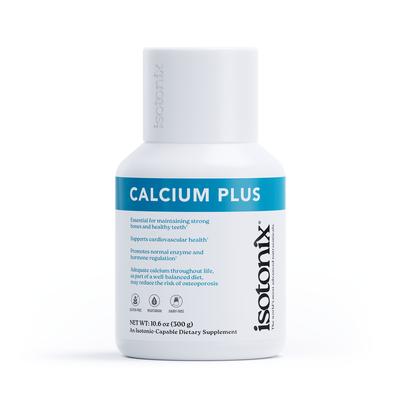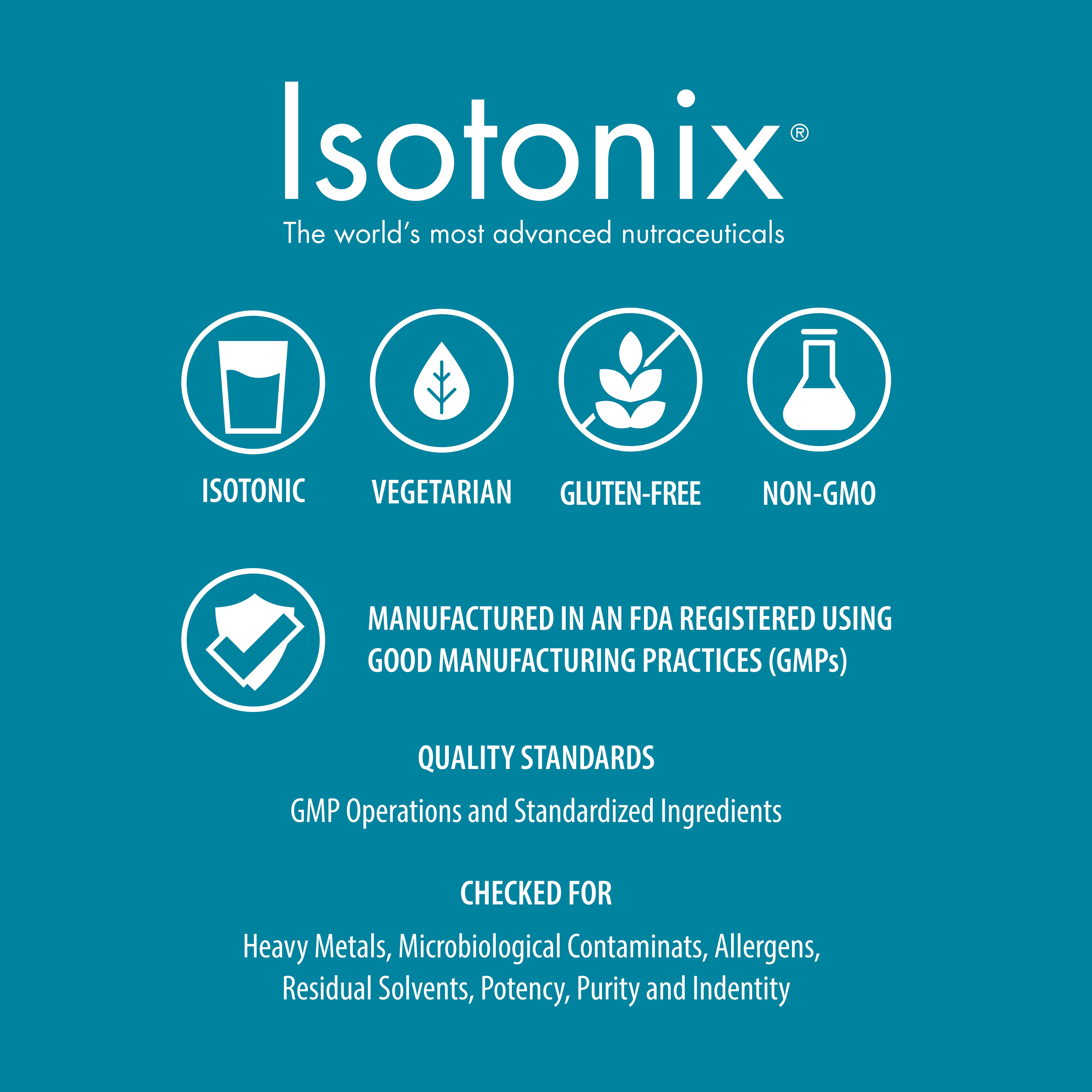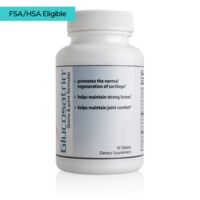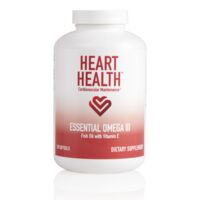認識更好的自己!
益處
維持骨骼強壯、牙齒與牙齦健康不可或缺的營養
- 支持骨骼健康
- 幫助正常的酵素調節與荷爾蒙分泌
- 支援心血管健康
其他益處
- 充足的鈣與維生素D作為健康飲食的一部分,加上體育運動,可以減少晚年患骨質疏鬆症的幾率
- 在骨骼和心臟肌肉的正常收縮中發揮關鍵作用
- 支持肌肉正常使用和表現
- 有助維持健康的免疫功能與整體健康
- 幫助維持健康的膽固醇值
- 支持適當的神經傳導
- 促進正常的荷爾蒙分泌
- 幫助緩解經前症候群的不適
- 促進正常血液凝結
- 維持健康的血糖值
- 維持健康的體重
- 有利孕期健康與胎兒發育
- 不含麩質
- 無可測出基改成分
- 素食可用
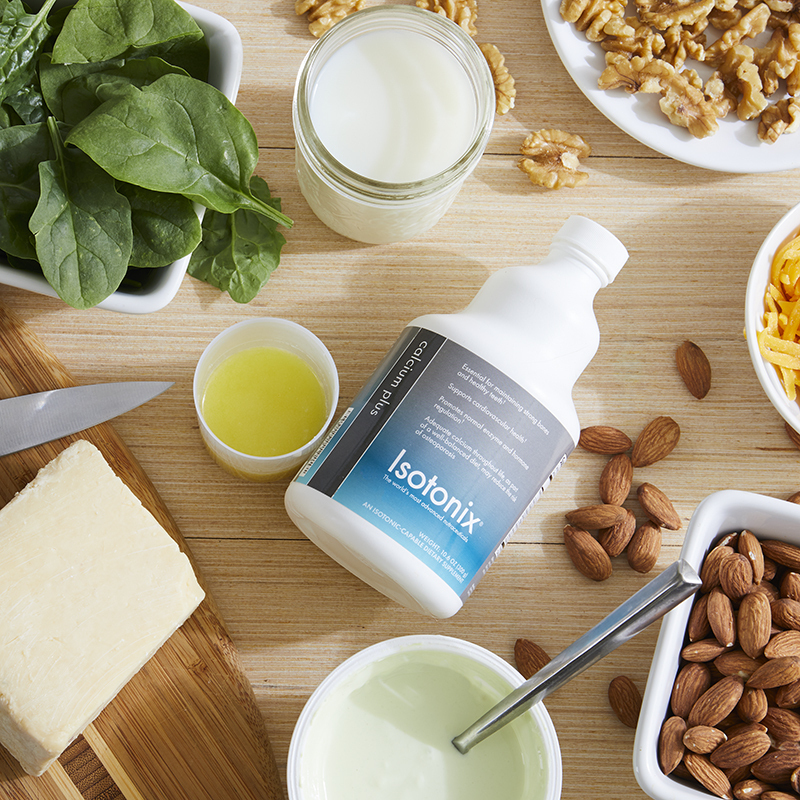
為什麼選擇Isotonix Calcium Plus強鈣配方粉末?
對於建構並維持強壯的骨骼來說,鈣是一種不可或缺的元素。Isotonix Calcium Plus強鈣配方粉末透過等滲透壓溶液,為人體提供最適量的鈣、維生素D3、鎂及維生素C,讓人體能迅速吸收。
Isotonix Calcium Plus強鈣配方粉末採用等滲透溶液傳輸方式,比一般的錠狀片劑更高效。鈣片中的鈣質很難為身體吸收。由於許多鈣片沒有加配能夠幫助身體吸收和利用鈣所必需的維生素D及鎂,可能致使人體無法從中吸收到鈣質;即使鈣片的配方調配正確,身體也很難利用或分解錠狀鈣片。一種可能的原因是許多鈣片使用的鈣質取自蛋殼或牡蠣殼,所以不能被人體很好地吸收。另外一個原因則可能是鈣片內的黏著劑(DCP)成分阻礙了身體對鈣質的吸收。DCP無法在人體內分解。即便鈣片不含黏著劑,身體仍然需要先分解這些壓製而成的片劑,之後才可以為身體所用。如果鈣片無法在胃部有效分解,鈣質就無法被吸收。鈣片無法分解,身體就無法得到所需的鈣質來發揮功能。
傳統的錠狀鈣片需要胃酸將其溶解,而Isotonix Calcium Plus強鈣配方粉末不需胃酸的幫助,它提供一種高效的、更易被小腸吸收的鈣溶液。Isotonix Calcium Plus強鈣配方粉末天然的柑橘口味,比一般嚼片的乾粉口感更受喜愛。市面上有許多鈣質補充品,但只有Isotonix Calcium Plus強鈣配方粉末可以透過等滲透傳輸系統,為您提供強效的鈣質及其他營養素。與其他錠狀鈣質補充產品相較,Isotonix Calcium Plus強鈣配方粉末能為身體提供更多易吸收的有效成分,從而從整體上降低了其成本。別被成分數字誤導了;最終能被身體利用的有效成分含量才算數。
成分
常見問答
I'm not an elderly woman. Why should I take a calcium supplement?
Calcium plays a huge role in regulating many major bodily processes with implications that extend far beyond the age factor. Other than elderly women who may be susceptible to bone loss, younger women, pregnant and lactating women, growing children and men should take a calcium supplement.
Younger women need more calcium to build up the strength of their bones. Pregnant and lactating women need extra calcium, at least 1200 mg/day to foster the healthy growth of new cells and of breast milk. Growing children need extra calcium, sometimes two to four times as much as an adult to assist with new bone development and proper growth. Finally, those with poor cardiovascular health have been found to have low levels of calcium intake. Studies have confirmed that calcium supplementation supports heart health.*
I've heard calcium is great for PMS? How so?PMS is an undesirable influence on physical and psychological peace of mind. Recent studies have found that over 70 percent of relationships are affected in some way by PMS. So PMS impacts nearly everyone, including men! Supplementation with calcium can reduce PMS symptoms. In a study conducted by the US Department of Agriculture's Human Nutrition Research Center, it was found that women on a high calcium diet had decreased irritability, cramping and bloating associated with PMS. Ovarian hormones affect calcium, magnesium and vitamin D metabolism. Estrogen regulates calcium metabolism, intestinal calcium absorption and parathyroid gene expression and secretion, triggering fluctuations across the menstrual cycle. As a woman menstruates, her hormones are "all over the place." Clinical trials in women with PMS have found that calcium supplementation helps reduce mood and somatic symptoms associated with PMS.*
What is the suggested age to begin taking Isotonix® Calcium Plus?Isotonix Calcium Plus is recommended for all adults age 18 or older. If we only absorb 300 to 400 mg of calcium at a time, why does one capful contain 750 mg? There are 750 mg of calcium in 2 capfuls of Isotonix Calcium Plus. Therefore, one capful equals 375 mg of calcium.
Why is Isotonix Calcium Plus better than other calcium products?It is better because of the Isotonix delivery system. The secret of the isotonic process is probably now becoming clear! When an isotonic substance enters the body, it will be absorbed into the bloodstream rapidly. With isotonic fluids, little nutritive value is lost making the absorption of nutrients highly efficient. There is nothing artificial about it. An isotonic fluid is nature's own nutrient delivery system.
Why is there a sandy residue left in the cup after mixing with water?Everyone's water is different; some tap water has a higher concentration of minerals and the pH level of water differs depending on geographic location and the quality of the tap water, which can lead to inconsistencies with the saturation point of a solution. To ensure that our solutions reach the point of saturation, regardless of the pH or mineral levels in water, we have maximized the formulation amounts so that every serving of Isotonix Calcium Plus contains the correct amount of calcium. The residue left in the cup is due to over-saturation which is common in tap water with a higher pH level or a higher mineral content.
What is the best way to store this product?
Keep Isotonix stored in a dry, cool place. If Isotonix are stored in the kitchen, keep them away from the stove, sink, heat-generating appliances or window ledges. If you live in a very humid area, you may store Isotonix products in the refrigerator – but not in the fruit and vegetables area.
科學
- Beattie JH, Peace HS. The influence of a low-boron diet and boron supplementation on bone, major mineral and sex steroid metabolism in postmenopausal women. Br J Nutr. 1993 May;69(3):871-84.
- Dawson-Hughes B, Harris SS, Krall EA, Dallal GE. Effect of calcium and vitamin D supplementation on bone density on men and women 65 years of age and older. N Engl J Med. 1997; 337:670-676.
- Dietary Reference Intakes for Calcium, Phosphorous, Magnesium, Vitamin D, and Fluoride. Washington, DC: National Academy Press; 1997.
- Durlach J, Durlach V, Bac P, et al. Magnesium and therapeutics. Magnes Res. 1994; 7:313-328.
- Hussain S, Ali SF. Manganese scavenges superoxide and hydroxyl radicals: an in vitro study in rats. Neuroscience Letters. 1999; 261:21-24.
- Keen CL, Ensunsa JL, Watson MH, et al. Nutritional aspects of manganese from experimental studies. Neurotoxicol. 1999; 20:213-223.
- Martini LA. Magnesium supplementation and bone turnover. Nutr Rev. 1999; 57:227-229.
- Naghii MR, Wall PM, Samman S. The boron content of selected foods and the estimation of its daily intake among free-living subjects. J Am Coll Nutr. 1996 Dec;15(6):614-9.
- Newnham RE. Essentiality of boron for healthy bones and joints. Environ Health Perspect. 1994;102:83-85
- Nielsen FH. Studies on the relationship between boron and magnesium which possibly affects the formation and maintenance of bones. Magnes Trace Elem. 1990;9:61-69
- Nielsen FH. Ultratrace minerals. In: Shils ME, Olson JA, Shike M, Ross AC, eds. Modern Nutrition in Health and Disease, 9th ed. Baltimore, MD: Williams and Wilkins; 1999:283-303.
- Penland J.G. The importance of boron nutrition for brain and psychological function. Biol Trace Elem Res. 1998; 66:299-317.
- Reid IR, Ames RW, Evans MC, et al. Effect of calcium supplementation on bone loss in postmenopausal women. N Engl J Med. 1993; 328:460-464.
- Saris N-EL, Mervaala E, Karppanen H, et al. An update on physiological, clinical and analytical aspects (review). Clinica Chimica Acta. 2000; 294:1-26.
- Shils ME. Magnesium. In: Shils M, Olson JA, Shike M, Ross AC, eds. Modern Nutrition in Health and Disease. 9th ed. Baltimore, MD: Williams and Wilkins; 1999:169-192.
- Singh MA. Combined exercise and dietary intervention to optimize body composition in aging. Ann N Y Acad Sci. 1998 Nov 20;854:378-93.
- Singh N, Singh PN, Hershman JM. Effect of calcium carbonate on the absorption of levothyroxine. JAMA. 2000; 283:2822-2825.
- Strause L, Saltman P, Glowacki J. The effect of deficiencies of manganese and copper on osteo-induction and on resorption of bone particles in rats. Calcif Tissue Int. 1987; 41:145-150
- Sutherland B, Strong P, King JC. Determining human dietary requirements for boron. Biol Trace Elem Res. 1998 Winter;66(1-3):193-204.
- Tobian L. Salt and hypertension. Lessons from animal models that relate to human hypertension. Hypertension. 1991; 17:152-158.
- Volpe SL, Taper LJ, Meacham S. The relationship between boron and magnesium status and bone mineral density in the human: a review. Magnes Res. 1993;6:291-296
- Wargovich MJ, Eng VWS, Newmark HL. Calcium inhibits the damaging and compensatory proliferative effects of fatty acids on mouse colon epithelium. Cancer Lett. 1984; 23:253-258.
- Weaver CM, Heaney RP. Calcium. In: Shils ME, Olson JA, Shike M, Ross AC, eds. Modern Nutrition in Health and Disease. 9th ed. Baltimore, MD: Williams and Wilkins; 1999:141-155.
- Wolf RL, Cauley JA, Baker CE, et al. Factors associated with calcium absorption efficiency in pre- and perimenopausal women. Am J Clin Nutr. 2000; 72:466-471.
- Zemel MB, Shi H, Greer B, et al. Regulation of adiposity by dietary calcium. FASEB J. 2000; 14:1132-1138.
評論
顯示 1 - 5 的 99
01/16/2021
透過 YANA
我发表的产品评论
产品效果卓越!
顧客服務部的回覆
01/19/2021
尊敬的客户,
多谢您抽出宝贵时间分享您对
Isotonix®钙加!我们很高兴听到您对产品感到满意。
再次感谢你!
产品信息团队
Dear Valued Customer,
Thank you for taking the time to share your thoughts on the
Isotonix® Calcium Plus! We are happy to hear you are pleased with the product.
Thank you again!
The Product Information Team
10/11/2019
透過 XIAOYANZ
very good
Products you must use every day
10/19/2024
透過 匿名
Review of Calcium Plus
Easy to take and it helps me get my daily calcium intake. The company reps are friendly and terrific.
08/27/2024
透過 KathrynS
fantasic calcium supplement
I take this isotonic Calcium formula every day for osteoporosis. My bone density tests have improved so will never be without it. Quick absorbtion for great health.
顧客服務部的回覆
08/28/2024
Thank you for sharing your fantastic experience with Isotonix® Calcium Plus! We're thrilled to hear that it has had such a positive impact on your bone density and overall health. It's wonderful to know that you appreciate the quick absorption and have made it a daily part of your routine. Your positive feedback means a lot to us. Thank you for being a valued customer and for sharing your story with us!
08/28/2024
透過 JackieS
Calcium Plus
Women need 7x more calcium than men. My mother has osteoporosis and I want to stay on top of that so I reduce the risk to follow in her footsteps. I want to maintain my teeth and bones so I add this to my Dailey Essentials. Im in my 50's so hormone regulation is imperative.
顧客服務部的回覆
08/29/2024
Thank you for sharing your thoughtful review! We're glad to hear that Calcium Plus is an important part of your daily routine. It's wonderful that you're taking proactive steps to maintain your well-being. Your feedback means a lot to us. Thank you for choosing our product and sharing your commitment to health!
- 前一個
- 下一步
